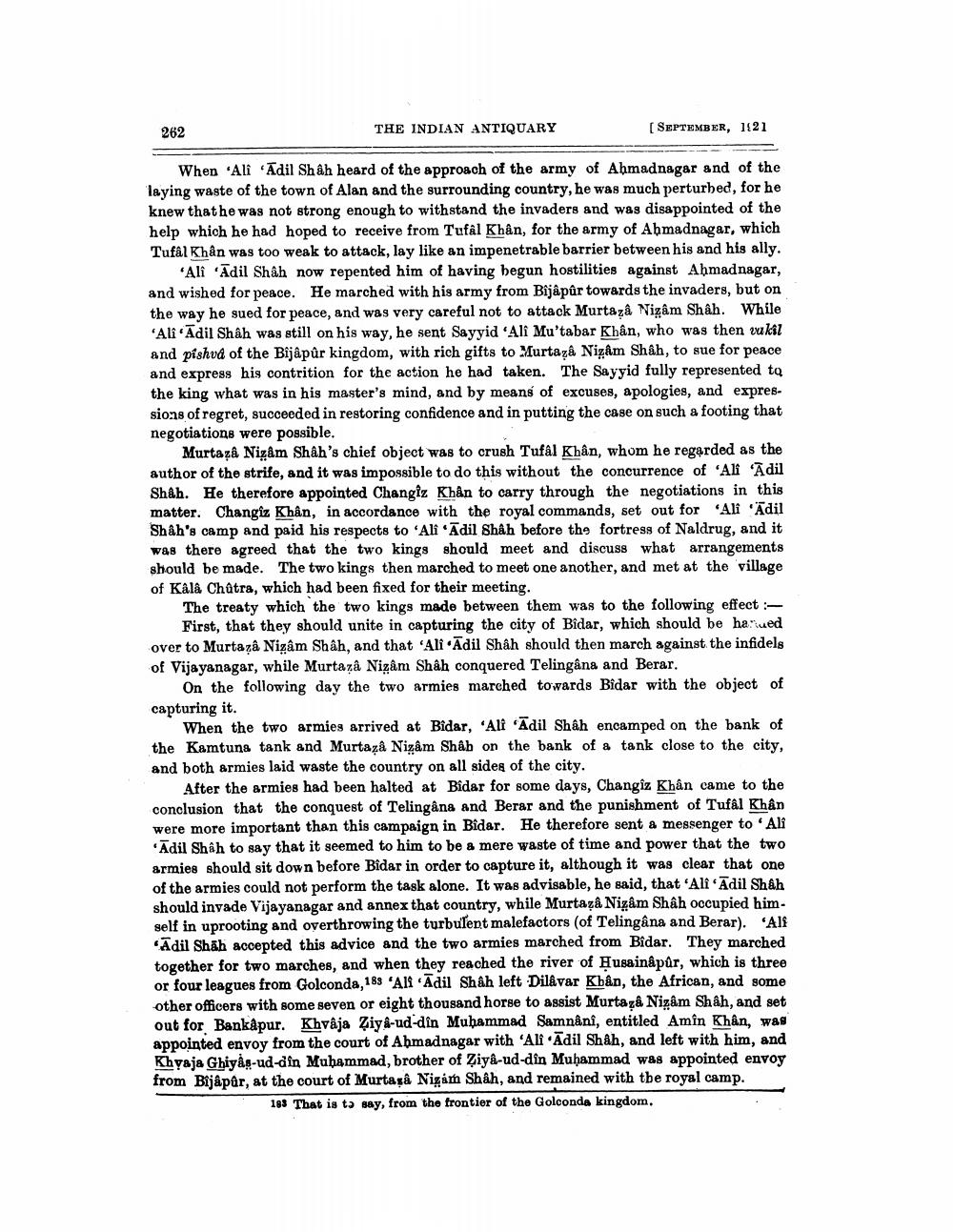________________
262
THE INDIAN ANTIQUARY
[ SEPTEMBER, 1:21
When Ali Adil Sh Åh heard of the approach of the army of Ahmadnagar and of the laying waste of the town of Alan and the surrounding country, he was much perturbed, for he knew that he was not strong enough to withstand the invaders and was disappointed of the help which he had hoped to receive from Tufal Khân, for the army of Ahmadnagar, which Tufâl Khân was too weak to attack, lay like an impenetrable barrier between his and his ally.
Alî 'Adil Shah now repented him of having begun hostilities against Ahmadnagar, and wished for peace. He marched with his army from Bijapur towards the invaders, but on the way he sued for peace, and was very careful not to attack Murtaza Nizam Shah. While 'Ali Adil Shâh was still on his way, he sent Sayyid Ali Mu'tabar Khân, who was then wakil and pishvd of the Bijâpûr kingdom, with rich gifts to Murtaza Nizâm Shah, to sue for peace and express his contrition for the action he had taken. The Sayyid fully represented to the king what was in his master's mind, and by means of excuses, apologies, and expressions of regret, succeeded in restoring confidence and in putting the case on such a footing that negotiations were possible.
Murtaza Nizam Shah's chief object was to crush Tufal Khân, whom he regarded as the author of the strife, and it was impossible to do this without the concurrence of 'Ali 'Adil Shâh. He therefore appointed Changiz Khân to carry through the negotiations in this matter. Changiz Khân, in accordance with the royal commands, set out for 'Ali `Adil Shâh's camp and paid his respects to 'Ali `Adil Shâh before the fortress of Naldrug, and it was there agreed that the two kings should meet and discuss what arrangements should be made. The two kings then marched to meet one another, and met at the village of Kâlâ Châtra, which had been fixed for their meeting.
The treaty which the two kings made between them was to the following effect :
First, that they should unite in capturing the city of Bidar, which should be harmed over to Murtaza Nizâm Shah, and that 'Ali Adil Shâh should then march against the infidels of Vijayanagar, while Murtaza Nizâm Shâh conquered Telingana and Berar.
On the following day the two armies marched towards Bidar with the object of capturing it.
When the two armies arrived at Bidar, Ali 'Adil Shah encamped on the bank of the Kamtuna tank and Murtaza Nizam Shah on the bank of a tank close to the city, and both armies laid waste the country on all side of the city.
After the armies had been halted at Bidar for some days, Changiz Khân came to the conclusion that the conquest of Telingana and Berar and the punishment of Tufal Khân were more important than this campaign in Bidar. He therefore sent a messenger to .Ali 'Adil Shah to say that it seemed to him to be a mere waste of time and power that the two armies should sit down before Bidar in order to capture it, although it was clear that one of the armies could not perform the task alone. It was advisable, he said, that 'Ali Adil Shah should invade Vijayanagar and annex that country, while Murtaza Nizam Shâh occupied him. self in uprooting and overthrowing the turbulent malefactors (of Telingana and Berar). All Adil Shah accepted this advice and the two armies marched from Bidar. They marched together for two marches, and when they reached the river of Husain&pur, which is three or four leagues from Golconda, 183 'Ali Adil Shah left Dilavar Khân, the African, and some other officers with some seven or eight thousand horse to assist Murtaza Nizam Shah, and set out for Bankapur. Khvâja Ziya-ud-din Muhammad Samnani, entitled Amin Khan, was appointed envoy from the court of Abmadnagar with 'Ali Adil Shâh, and left with him, and Khyaja Ghiyås-ud-din Muhammad, brother of Ziyâ-ud-din Muhammad was appointed envoy from Bijâpâr, at the court of Murtaza Nizam Shah, and remained with the royal camp.
188 That is to say, from the frontier of the Golconda kingdom.




